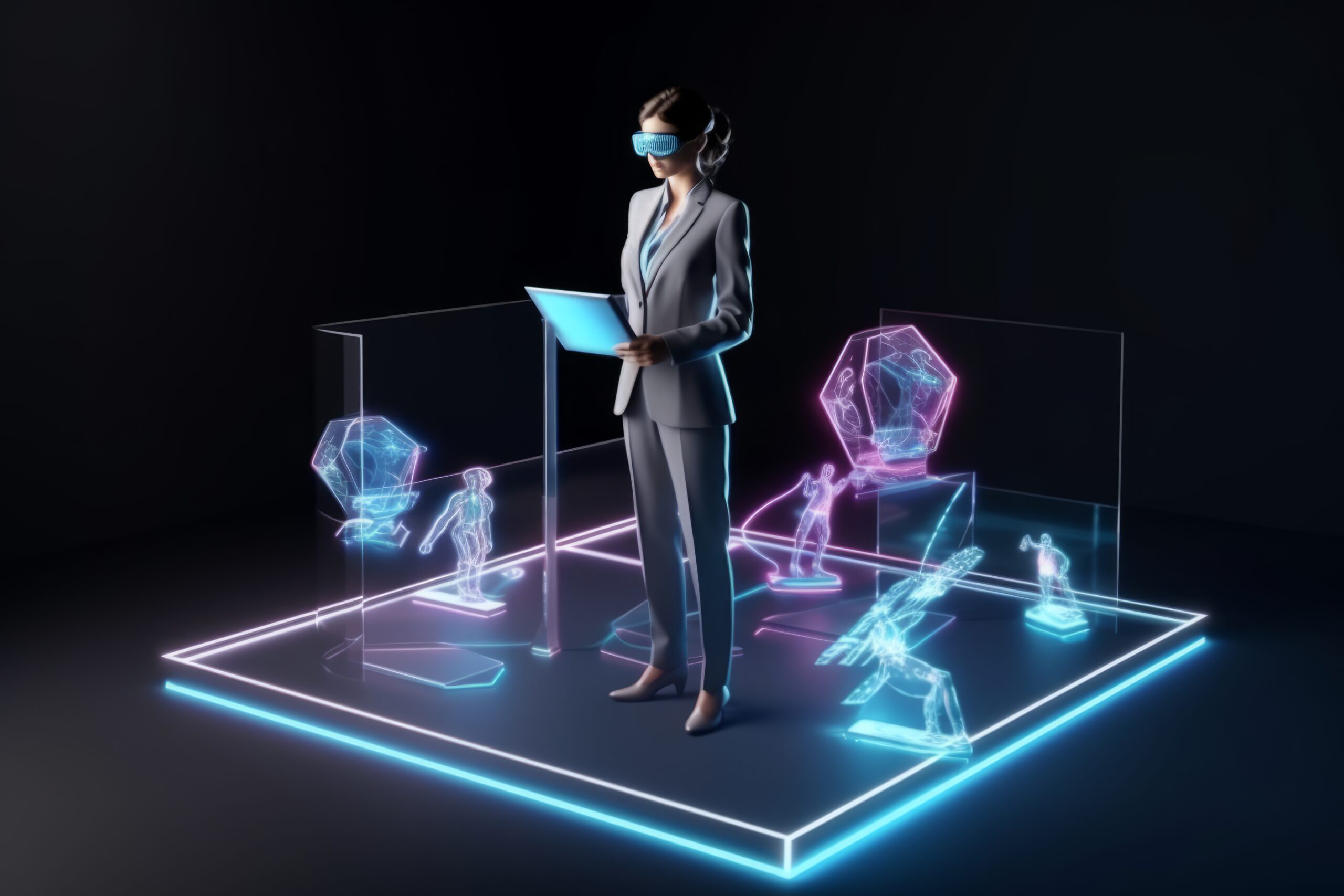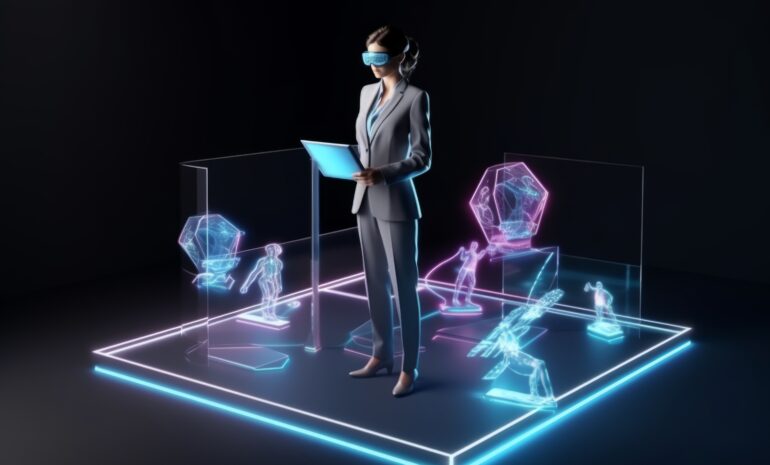The term “metaverse” is a new one that has taken the tech industry by storm, promising a tomorrow in which virtual and physical realities merge into immersive, always on virtual worlds. The metaverse runs on several advanced technologies that provide businesses with unlimited possibilities:
Traditional Virtual Reality (VR), Augmented Reality (AR), Blockchain, and Artificial Intelligence (AI).As Aspire TekHub Solutions, we foresee in the metaverse the possibility of transforming the way organizations engage with customers, innovate, and generate new income streams. In this article, we will explore what it is in detail, the evolution of the metaverse, and importantly what implication that has for your business.
Metaverse
In definition, the metaverse is a collective, virtual shared space that has been created by the convergence of virtually enhanced physical reality and physically persistent virtual reality. The metaverse is a vast digital universe within which people, represented by avatars, can interact and communicate with one another in real time for various purposes-ranging from socializing and gaming to collaborating and shopping.
The metaverse is generally understood as the 3D version of the internet, and one in which a multiplicity of digital worlds, augmented realities, and real-world data converge to allow for captivating user experiences. Whether in the forms of gaming realms, virtual offices, or digital stores-the metaverse is really taking the center stage in our digital future.
Among the many drivers of the metaverse, some of which we shall briefly outline here include the following
Virtual Reality (VR)
Fully immersive, high-tech experiences in which virtual environments are simulated.
Augmented Reality (AR)
Bringing into a real world digital objects and converging them together providing a more enhanced experience.
Blockchain
Schemes by which ownership, transfer, and management of digital assets and currencies is assured within the metaverse.
Artificial Intelligence (AI): Enabling more intelligent and highly interactive experiences in virtual worlds
The Metaverse and Its Effect on Business
The metaverse will transform how businesses go about their operations and engage with their customers. Though in its infancy, a lot of companies, across all industries, are already harnessing metaverse platforms to connect with their audience in a totally new way. Here is how the metaverse enters the picture
New Stream Revenue and Business Model
The possibilities are endless regarding what is exciting about how the metaverse can enable new streams of revenue. Metaverse will create income beyond traditional channels through virtual stores, digital goods, and immersive brand experiences. Virtual land, including NFTs (non-fungible tokens) and digital events, is emerging as a valuable commodity in this new world.
For example
Retailers want to design virtual clothes that users can purchase for their avatars, while entertainment companies are creating events and concerts that charge for admission. The gaming industry is leading the way with in-store purchases of virtual assets, skins, and even properties within the metaverse.
A business has to commence envisioning how to monetize digital products and experiences in this new virtual economy. Whereas physical goods are still regarded as being of value, the virtual assets and services emerging within the metaverse will give value to businesses in the making.
Enhanced Customer Experiences
The Metaverse is truly a technological marvel that is finally here to redefine customer experiences. Unlike mainstream online experiences, the level of immersion and interactivity the metaverse brings provides for a whole new domain where engagement between customer and brands goes many levels deeper.
To illustrate, the retailer can create a virtual store through which consumers can “walk” down aisles, pick up products, and even put on clothes or accessories while gazing into a likeness of themselves or an AR framework. A completely interactive and personalized shopping experience such as this not only makes the buying process fun but also leads to improved conversion rates.
Again, brands can do product launches or live Q&As, or they can take customers on a virtual tour, all of which allows customers to have some creative interactions with their products. This kind of interaction fosters brand loyalty among its consumers and nurtures consumer relationships.
Remote Work and Virtual Collaboration
The COVID-19 pandemic has speed up the work-from-home and remote collaboration technologies. The metaverse will see this evolution next with virtual workspaces wherein employees will meet each other as if they were all physically present in the same office, collaborate, and work together.
The metaverse, therefore, allows for uninterrupted communication and collaboration amongst teams scattered on diverse locations. Employees can create custom avatars, attend virtual meetings, and collaborate with their peers using the environment in a fully immersive manner, promoting significantly more productive, creative, and engaging experiences at work free from the constraints of geography and conventional office space.
Companies such as Meta (formerly Facebook) have begun exploring metaverse workspaces, letting employees work from within a virtual space. With the inception of technological evolution, more and more businesses are expected to follow in their footsteps with regard to everyday integration in virtual offices.
Marketing and Branding Options
While digital marketing typically involves placing ads on websites, advertising in the metaverse provides opportunities for creating hyper-immersive experiences where consumers can interact with the brand’s products or services in meaningful ways.
Marketers will be able to create branded virtual environments within which they can hold interactive events or partner with influencers to create the content in that space. The resulting experience is far more engaging than a static advertisement and can thus ensure brands cut through the crowded digital clutter.
For instance, brands in fashion and retail already experiment with virtual fashion shows and digital clothing collections. These interactive experiences will surely draw in and leave a lasting impression on a new generation of digital-native consumers.
The metaverse allows for hyper-personalization in marketing. It uses analytics and AI to tailor virtual experience opportunities for individual users that are personalized, cooperative, and generate deeper interactions.
Virtual Trade and Digital Goods
With the metaverse developing, this generates opportunities for businesses to take part in virtual commerce. Digital assets, including NFTs and cryptocurrencies, are rising in popularity, but the metaverse creates a myriad of possibilities for the buying, selling, and trading of goods.
Particularly regarding virtual economies and the metaverse, NFTs have become central to it. These assets are one-of-a-kind, verifiable, and can represent anything from artwork and music to virtual real estate and in-game items. Thus, businesses investing in NFTs can create unique digital offerings ranging from limited-edition items to collectibles within the metaverse clients can buy and own.
Moreover, Bitcoin, Ethereum, or even those truly unique to particular platforms will facilitate transactions in these virtual spaces. Accordingly, companies will have to adapt to accepting such digital currencies as payment, making transactions easier with a decentralized virtual economy.
Innovation in Product Development
The metaverse is a creative playground in which companies can try out new products and services safely before introducing them to the market. Virtual worlds are the ideal testing ground for prototypes, gathering feedback from users, and assessing them in real-time.
For example
A car maker could set a virtual showroom in which customers can see and customize from a wholly virtual model under release. Alternately, new hardware or software meant for use may be released by technology firms, testing its use in a virtual trial immersion that would be an excellent source of insight into user preferences.
This very low-risk opportunity allows businesses to prototype and test products in the metaverse and thus innovate faster. The opportunities for harnessing metaverse-based training and development into everyday life allow businesses to explore metaverse as a critical tool for product development and customer feedback.
Training and Development
Once employees are trained in the metaverse, they can expect great advantages over traditional methods of training. Training done in the VR space tends to be more engaging, interactive, and effective in providing them with hands-on knowledge of real-life scenarios.
For instance, VR can enable healthcare companies to train doctors and nurses in such complex medical procedures in a safe environment. Likewise, workers in factories can be trained to operate machines through virtual simulations, leading to a reduction of on-the-job accidents while enhancing proficiency.
Metaverse-based training also tends to drive up knowledge retention since people are more likely to remember what they learned in an interactive setting than in a traditional training program. By adopting metaverse in their training program, businesses can upskill their workforces more efficiently and effectively.
Bottlenecks and Pointers for Organizations that Target the Metaverse
The metaverse is an intriguing proposition but there are several things that businesses should check out in venturing into this phenomenon.
Capital Outlay on Technology
No doubt creating experiences for the metaverse is capital intensive as it involves availing VR, AR, AI, and other supporting technologies. Organizations should be ready to spend not only on the tools but also on the labor needed to develop content for experiences that are engaging and entertaining.
 Data Safety
Data Safety
The coming metaverse will also come with a lot of user generated content and thus data privacy and safety issues are likely to be a common concern. They must also have measures to ensure their customers’ information is not compromised by implementing rigid data management policies.
Openness
Interoperable environments, that is the capability of internal and external virtual worlds and platforms to work together and hence enable the users to hop from one experience to the other will determine whether the metaverse will be fully utilized. The corporation must look for and make use of networks which develop the notion of openness to monopolist clouds.
Consumer Centricity
Anyone whose success hinges on a metaverse will depend on user experience, it is the key. Organizations need to put efforts into designing and delivering comfy and fun spaces in the virtual world that any customer gets into for a positive interaction.
How to Prepare Your Business for the Metaverse
The metaverse keeps growing and there is need for businesses to start making plans towards such interactions. As such, below are some of the steps aimed at helping your business take off:
Learn and Get Involved
You may start off by informing your staff about the very basics of the Metaverse, its possible uses and all trending facts about it. It is also necessary to promote the metaverse use and its peculiarities in order to be aware about the users of such environments.
Provide the Proper Equipment:
Determine the technology stack you’ll need to develop engaging virtual elements about your business.
Begin with a Strong Foundation and Expand Gradually
It is best to begin by focusing on small scale competition opportunities such as attending or organizing virtual events with NFT collections, or initiating a temporary, limited virtual storefront. Once you understand the metaverse better, increase your stake and capabilities within it.
Engage with the Moving Force
Work with companies that are already engaged in the metaverse’s activities in order not to be left behind. Whether it’s working with technology companies, and programmers, or even content creators, working with such experts enables you to tackle the challenges that this industry presents.
Create Experiences
More than ‘Products’ focus on the need for user experience. Design interactive components that are pleasant and easy to use and that work optimally on various devices without compromising the aesthetics of the virtual spaces.
Conclusion
It is essential to note that the metaverse is not a passing craze. Instead, there is every indication that it is the Next Big Thing. Every ‘next generation’ of the virtual world will see businesses that learn to live within it earn themselves overwhelming market shares and every investment will assist in fostering creativity, customer participation and new business ventures.
Aspire TekHub Solutions understands how the metaverse can be used to revolutionize a business. From creating captivating brand experiences to designing a virtual workplace and incorporating digital assets in business strategy development – we will show you how to work within the metaverse and make the most out of it.
The metaverse has only begun to take shape. Is your company willing to take the plunge?


